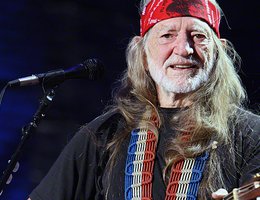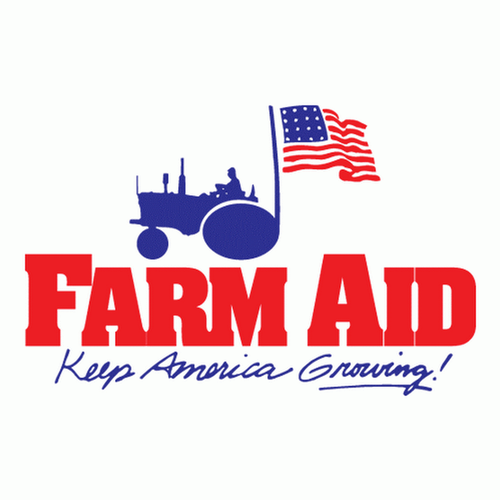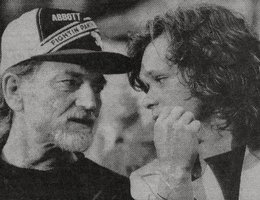
In the 1980s, celebrities — particularly those with rural backgrounds — were concerned with the crisis on the farm. Farm Aid was one response.

Willie Nelson is from the plains of Texas. In 1985, he wanted to heighten public awareness of the plight of the family farmer and raise money for farm support groups. So he, Neil Young, and John Mellencamp organized a benefit concert at the University of Illinois. A wide variety of performers appeared on that first Farm Aid show, usually at their own expense. Willie assembled a "cast of thousands" to help entertain people and draw attention to the farmers’ plight. Performers included John Denver, Kris Kristofferson, Willie Nelson and his family, the Grateful Dead, and others.
The first concert was a success, and the Farm Aid Concerts have now become an annual event. The third concert in 1987 was held in Lincoln at the University of Nebraska. Performers included Steppenwolf, Vince Gill, Lyle Lovett and John Denver and, of course, the founders of the event, Willie, John, and Neil. The Grateful Dead performed live over a TV satellite feed.

The first concert raised $9 million and the second raised $2.5 million. The third concert in Lincoln had ticket sales that exceeded $1.3 million. There were expenses of approximately $1 million, which included television production expenses, but those expenses allowed the concert to be carried on cable and television stations across the country — 85% of the country was able to watch the prime-time broadcast of the Farm Aid III concert on television. Those viewers were invited to pledge money to the Farm Aid foundation. Those pledges added to money from corporate sponsors, souvenir sales and other sources went directly to farmers.
A few months before the 1987 concert, the non-profit foundation for Farm Aid said it had distributed $6.4 million to 100 organizations aiding farmers in 39 states. In Nebraska, $163,300 went to such groups as Interchurch Ministries of Nebraska, Farm Crisis Committee of Emerson, Farm Crisis Network, and the Great Plains Organizing Project.
But, Willie Nelson was realistic about the impact those funds could have.
"We’re not doing that much. We can’t do that much. The national farm debt is like $250 billion. And we don’t have the money to bail all the farmers out. All we can do is take what little money we have and spread it around to the various hotlines and food pantries over the country. It’s not a lot of money, and once you spread it out that thin, a lot of people don’t get much.
I don’t want to be Jerry Lewis. I don’t want to be on television every year. That’s not what I do for a living. I would hope that by the time Farm Aid III is behind us, that the awareness of the situation would stir up enough caring people in this country to put some pressure on our politicians do something about it."
But despite somewhat better ag prices, there are still farmers being forced off the land, and Farm Aid has continued its annual concerts.
Willie Nelson has personally signed all grant checks that go to organizations that spend the money to help farmers. The cost to stage Farm Aid concerts has remained at less that one per cent of the donations, which is low compared to what some charities spend for administration.

Nelson says that Farm Aid should be an awareness organization.
"I hope that soon this country will wise up and see what’s going on and call their congressman, call their lawyers, call anybody they can call that will do something about it. Obviously, they don’t know the situation.
"They don’t realize that once the corporate people take over [the prices for] their bread and milk will definitely go up because the corporations are not going to be able to find people who are willing to work from sunup to sundown seven days a week for practically nothing. The price of everything has to go up once the corporations take over."
Concerts have not been the only Farm Aid activity. In 1987, just before the Lincoln concert, Willie Nelson and John Mellencamp went with a group of family farmers to testify in front of the U.S. Congress about the state of family farming in America. In part as a result of their efforts, Congress passed the Agricultural Credit Act which said that the Farmer’s Home Administration (FmHA) could not foreclose on any family farmer unless the FmHA would make more money through foreclosure that they would by investing to make the farm profitable. That was a major policy change, and may have helped more stay on the farm.
Most Nebraskans think the farm crisis ended in the 1980s. But, that is not the position of Farm Aid. Nelson and his supporters believe that high interest rates, overproduction, export market problems, low prices for farm commodities, the high cost of equipment and the ever expanding size of farms seem to be problems that farmers, to some degree, face regardless of the time period.
Actor Charles Haid (best known for playing Renko on "Hill Street Blues") said,
"One of the biggest problems facing farmers is convincing others that the farm crisis is an on-going concern. People who pooh-poohed the farm crisis should be forced to meet the farmers who are still losing their land."
Farmers’ reactions to the Farm Aid concerts were as varied as the farmers themselves. Some complained that Farm Aid III benefited the business community of Lincoln and did little for the farmers. One farmer said that the commercialism bothered him. Some farmers didn’t think contributions to Farm Aid did much for farmers who were struggling to hold on to their farms. Contributions were used to help buy groceries or pay bills for farmers who had lost or were about to lose their farms. Little of the money would find its way to the many farmers who were not about to declare bankruptcy, but could well do so in the future.
But other farmers appreciated the concert and the monetary grants. And, as Willie Nelson has often pointed out, Farm Aid doesn’t have enough money to solve farmers’ debt problems. Its funds are used to help with emergency food and medical needs. Limited legal assistance is also provided to support organizations trying to explain farm issues to the public.
As another farmer said,
"I think it’s great, I’m 100% for it. If it doesn’t help the farmer directly, it will make people aware that we have problems out here."